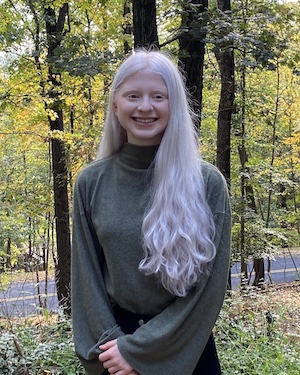By Julie Flandreau
Studying internationally was never in Sarah Kane’s plans. Yet, having graduated from the University of Pennsylvania last spring, the 23-year-old Marshall Scholar from Mendham, New Jersey, is now pursuing a Ph.D. in the field of Galactic Archeology from the prestigious halls and laboratories of Cambridge’s Trinity College, where she and her guide dog Elana have found a happy home.
“This first year has been extremely exciting to me because the program is exclusively research-based. I get to come to work and do research all day,” said Kane. Defining the object of her research and the field of Galactic Archeology, she explained: “Stars live for an immensely long time. So, we can use them as a fossil record of the galaxies’ history. We are treating stars as pseudo-fossils. My goal here is identifying stars that were formed in massive clusters, which is key to understanding the formation of stars in the Early Milky Way.”
A 2022 ΦBK inductee, Kane’s path took a turn when she participated in a REU (Research Experiences for Undergraduates) program in the Astronomy Department of UC Austin. “I was working with Professor Keith A. Hawkins at the time, and he had done a Ph.D. in the UK,” she said. “Here, the field of Galactic Archeology is much more developed, notably through the European Space Agency’s GAIA project. So, I began to think that maybe I, too, should spend some time over there.”
Since its inception in the postwar international scene of the 1950s, the Marshall Scholarship has funded young American scholars in their pursuit of graduate studies at UK universities across a wide range of disciplines. Administrators of the program explain it was originally construed as a gesture of gratitude from the UK government for the United States’ Economic Recovery Program (ERP)—also known as the “Marshall Plan”.
The diplomatic heritage of the scholarship, though, according to Kane, is relatively subtle. Along with other UPenn-graduates and 2023 Marshall Scholars Carson Eckhard (now pursuing an master’s in history from the University of Edinburgh and master’s in socio-legal research at the University of Oxford) and Amy Krimm (completing an master’s in psychology of the arts, neuroaesthetics, and creativity at Goldsmiths, University of London, and a master’s in history of art), Kane was flown in September from Washington D.C. to London. From there, each of the 40 scholars were dispatched to their respective universities, where they are to act as informal ambassadors to the UK.
Over the next two years, Kane will have to come up with her dissertation prospectus—a project she looks forward to, especially with Elana by her side. The two of them are without a doubt a path-forging duo. “When I got here, Trinity College had never allowed dogs inside its halls. As a matter of fact, its no-dog policy was so famous, so strict, that Lord Byron is said to have once brought a bear to the College, in protest of the dog-ban. To no avail. So I like to joke: Lord Byron = zero, Sarah Kane = one!”
Once that is over with, Kane dreams of pursuing her academic research, first via a post-doc position, then, hopefully, a professorship. She says that she “loves the fact that, through academia, [she] can simultaneously pursue scientific research and advocate for the blind and disabled communities, which are [her] communities.” One day, too, she would like to return to the U.S. But all that is still light-years away. For now, Kane shall focus on the stars, as they can be experienced from the British ground.
In higher education, Kane remarked, it is so easy to get bogged down in the details of a specific field of study and forget the inherent value of knowledge in other disciplines “A liberal arts education encourages students to look at the bigger picture, to meet people who are different from themselves, and to embrace skills and perspectives that they might not gain solely from their own major” Kane said. “Speaking personally, although I study astrophysics, I consider taking my philosophy minor to be one of the best choices I made during my time in undergrad. From my philosophy courses, I learned different ways of thinking, how to approach world issues logically, and enhanced my writing skills—all experiences that are immensely valuable both in astronomy and in my broader life.”
Julie Flandreau graduated from the University of Pennsylvania in May 2023 with a degree in comparative literature and religious studies. She was inducted by the Delta of Pennsylvania chapter of Phi Beta Kappa that same year.




